Written by Living Buddha Lian-sheng, Sheng-yen Lu
Although the practice of Zen ignores the cultivation of the body and focuses completely on the “spiritual aspect,” while the Vajrayana practice places equal emphasis on the cultivation of the “body” and “spirit,” the ultimate goal for these two schools is the same. In other words, the paths of Zen and Vajrayana eventually become one. Although Zen practitioners do not engage in the practice of Energy Yogas, during the process of complete translation of the egotistical consciousness into the Condition of Emptiness, and when the cessation of thoughts occurs, the energy in the entire body will naturally return to its source.
There was this one method we used in the past. There is a particular point inside the body at the third-eye charka. When one quiets down completely, the whole body’s “ching,” “chi,” and “shen” (generative, vital, and spiritual energy) becomes concentrated and return to their source at that one point. It is a very natural phenomenon, requiring no maneuvering of one’s own. Therefore, at this moment when the entire body’s “ching,” “chi,” and “shen” become concentrated at that single point, the same goal achieved by Vajrayana practitioners is arrived at by Zen practitioners. In the cultivation of the Energy Yoga (a Vajrayana practice), the practitioners first develop a full and vigorous chi to open up the central channel, then they bring all of the chi in the body to one single point. This turns out to be the same mechanism that is at work when a Zen practitioner truly enters into a state wherein the self is transcended. Although Zen does not engage in the practice of “chi, channel, and light drops,” at the moment when the egotistical mind is completely transcended, the energy in the entire body also returns to its source. This is why the two paths eventually become one.
skip to main |
skip to sidebar

Om Cing Mu Siddhi Hum

Om Guru Lian Sheng Siddhi Hum

Om Guru Lian Sheng Siddhi Hum


Om Pie Ca Ta Tu Fan



Om Ami Te Wa Se


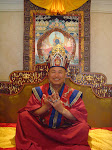

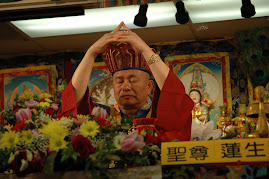


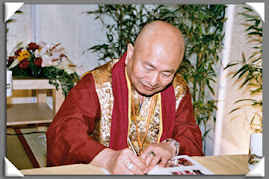

Om Wa Jera Ta Mo Sie
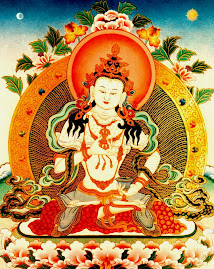
Om Pie Ca Sa To A Hum Phei

Om Cing Mu Siddhi Hum
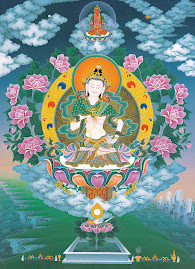

Om A Mi Te Wa Se

Om Mane Padme Hum

Om, Ha Ha Ha, Wei San Mo Ye, Soha

Om Cale Cule Cundi So Ha

Om, Cem Pa La Cha Len Cha Na Ye, So Ha

Om, A Hum, Pie Ca Kulu, Pie Ma, Sie Ti, Hum, Siek

Om, A Hum, Guru Pei, A Ho Sa Sa, Maha Lian Sheng, Siddhi, Hum

Tie Ya Tha, Om, Pie Kha Ce Ye, Pie Kha Ce Ye, Ma Ha, Pie Kha Cie Ye, La Cha, Sa Mo, Cia Te Hei, Soha
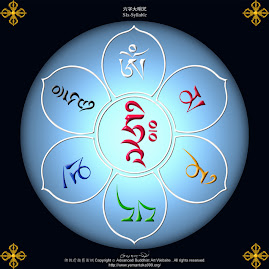
Om Mane Padme Hum
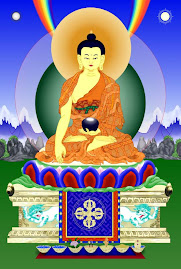
Om Moni Moni Maha Moni Se Cia Moni So Ha

Om Tare Tutare Ture So Ha
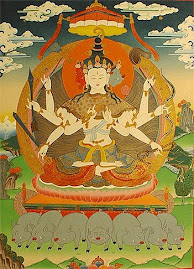
Om, Mo Li Zhi Yi, Soha

Om Ha Ka Ma La Wa La Ya So Ha

Om, Chou Li, Ka La Lu Pa, Hum Khan, Soha

Namo Samantho Wajera Lan Han
Little Spot of the TBSN Student
Yao Che Cing Mu
Om Cing Mu Siddhi Hum
GM with 5 Talisman

Om Guru Lian Sheng Siddhi Hum
GM short Mantra

Om Guru Lian Sheng Siddhi Hum
GM in Several Forms

Labels
- Dharmapala (4)
- GM Dharma (40)
- Sutra (16)
- TBS Master Dharma (3)
Blog Archive
-
▼
2007
(33)
-
▼
December
(33)
- The Annotated of True Buddha Sutra
- The Bodhisattva Vows
- The Buddha Speaks the Cancer Healing Sutra
- The Buddha Speaks The Ullambana Sutra
- The Dharani Sutra of Hundred Thousand Seals
- The Sutra About The Deep Kindness Of Parents
- The Sutra On The Merit Of Bathing The Buddha
- The Visualization Sutra
- Ways of Teaching Buddha Dharma
- What is Unchangeable?
- What You Have in Your Hands Does Not Exist!
- You are a Buddha & A Buddha You Are
- Zen & Vajrayana - different paths to the same goal
- Why Did Buddha Seek Ordination
- Wine and Meat Don't Matter
- Uccusma Vajrapala Great Sovereign Divine King
- True Buddha Sutra
- Understanding The Law of Karma
- Usnisa Vijaya Dharani
- Yamantaka
- The Compassionate Vows of Amitabha Buddha
- Hevajra
- Kalachakra Specific Precepts & Mandala
- The High King Avalokitesvara Sutra
- Amitabha Buddha Sutra
- Great Compassion Dharani Sutra
- Heart Sutra
- How to Setup a Tantric Shrine
- Cherish The Tantric Lineage
- Deva Marici Sutra
- Do Not Slander the Tantric Teachings
- General Purpose of Empowerment
- Jambala
-
▼
December
(33)
Vairocana Buddha

Om Pie Ca Ta Tu Fan
Amitaba (3's)

Amitaba (3's)

Amitaba stand on Lotus

Om Ami Te Wa Se
Amitaba with Character Fo

GM KL Kalachakra Homa 2007

GM with Kalachakra Mudra

GM_1

GM_2

GM_3

GM_4

GM in writing

Chien Sou Kwan Im

Om Wa Jera Ta Mo Sie
Vajrasattva

Om Pie Ca Sa To A Hum Phei
Golden Mother

Om Cing Mu Siddhi Hum
Vajrasattva_2

Amitofo

Om A Mi Te Wa Se
Kwan Im Phusa

Om Mane Padme Hum
Ti Cang Wang Phusa (Ksitigarbha)

Om, Ha Ha Ha, Wei San Mo Ye, Soha
Cundhi

Om Cale Cule Cundi So Ha
Yellow Jambala

Om, Cem Pa La Cha Len Cha Na Ye, So Ha
Padmasambhava

Om, A Hum, Pie Ca Kulu, Pie Ma, Sie Ti, Hum, Siek
Hua Kuang Ce Chai Fo

Om, A Hum, Guru Pei, A Ho Sa Sa, Maha Lian Sheng, Siddhi, Hum
Medicine Buddha

Tie Ya Tha, Om, Pie Kha Ce Ye, Pie Kha Ce Ye, Ma Ha, Pie Kha Cie Ye, La Cha, Sa Mo, Cia Te Hei, Soha
Sad Aksara

Om Mane Padme Hum
Sakyamuni Buddha

Om Moni Moni Maha Moni Se Cia Moni So Ha
Tara

Om Tare Tutare Ture So Ha
Marici Phusa

Om, Mo Li Zhi Yi, Soha
Kalacakra

Om Ha Ka Ma La Wa La Ya So Ha
Yamantaka

Om, Chou Li, Ka La Lu Pa, Hum Khan, Soha
Acala

Namo Samantho Wajera Lan Han
About Me
- Albertus Cahyadi
- Beijing, China
- Adhistana by Grand Master: 1) Vairocana Buddha, October 1996. 2) Fire Puja, Inner Vase Practice and Inner Fire Practice Empowerment, 19th October, 2007. 3) Kalachakra True Vajrakila Practice Empowerment, The Golden Mother Seven Great Practices Empowerment, Money Horse Empowerment, 20th October, 2007.